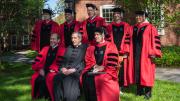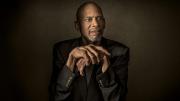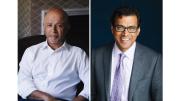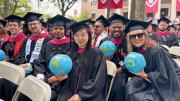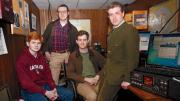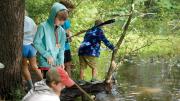During the 372nd Commencement this morning, Harvard will celebrate six distinguished leaders, conferring honorary degrees on four men and two women:
• a pair of life-sciences leaders (including an alumna who is a Nobel laureate);
• a two-time Pulitzer Prize-winning biographer (of a civil rights pioneer who is one of Harvard’s most distinguished graduates);
• an acclaimed U.S. military leader who expanded human rights;
• an alumnus who founded the nation’s only Spanish-language public radio network; and
• one America’s most honored actor-filmmakers.
Since the shift to separate Commencement and Alumni Day events, effective in-person last year, the cohort of honorands appears to have been reduced somewhat. The change—perhaps made to organize a morning ceremony that focuses appropriate attention on the graduates, the honorands, and the guest speaker’s address—in effect enhances the impact of each honorary degree. Call it Harvard’s answer to grade inflation.
Today’s honorands are listed alphabetically below, not necessarily in the order of conferral of degrees. (The guest speaker—this year actor Tom Hanks—has traditionally been recognized as the final degree recipient.) For details on the conferrals, check back for coverage of the Commencement ceremonies later today at www.harvardmagazine.com.
Jennifer A. Doudna, Ph.D. ’89, professor of biochemistry, biophysics and structural biology at the University of California Berkeley, shared the 2020 Nobel Prize in Chemistry for “the development of a method for genome editing,” the powerful “genetic scissors” named CRISPR/Cas9 (“clustered regularly interspaced short palindromic repeats,” including “CRISPR-associated” or “Cas” genetic sequences). The technique, now widely used to modify DNA with extraordinary precision, is of fundamental importance in molecular life science with applications from plant breeding to therapies for diseases—including the hope of addressing inherited diseases.
According to the Nobel Prize release, Doudna, an RNA researcher, became fascinated by Emmanuelle Charpentier’s investigation of how the Streptococcus pyogenes bacterium’s genes are regulated. Their intersecting research paths propelled new inquiries after a chance meeting at a conference in 2011, leading to the discovery of a technique for cleaving DNA at a precise point—work they published in 2012. As the Nobel summary put it:
Previously, changing the genes in a cell, plant or organism was time-consuming and sometimes impossible. Using the genetic scissors, researchers can—in principle—make cuts in whichever genome they wish. After this, it is easy to utilize the cell’s natural systems for DNA repair so that they rewrite the code of life.
Because this gene tool is so easy to use, it is now widespread in basic research. It is used to change the DNA of cells and laboratory animals for the purpose of understanding how different genes function and interact, such as during the course of a disease.
Her life and work are the subject of the bestselling biography, The Code Breaker: Jennifer Doudna, Gene Editing, and the Future of the Human Race (2021), by Walter Isaacson ’74. She is expected to be awarded an honorary Doctor of Science (S.D.) degree.
Tom Hanks, who will address the graduates, is widely known for comedic roles in Splash, Big, and A League of Their Own, and has won Academy Awards for best actor for his dramatic performances in Philadelphia and Forrest Gump. His other credits range from Sleepless in Seattle and You’ve Got Mail to Apollo 13 and voicing Woody in Toy Story. He collaborated with Steven Spielberg, Ar.D. ’16, on several films, and has won multiple Emmy Awards for producing limited series and television movies such as Band of Brothers and John Adams. His debut novel, The Making of Another Major Motion Picture Masterpiece, was published May 9.
The University announcement of his selection described him as an “actor, writer, filmmaker, humanitarian, and typewriter enthusiast” (the latter featuring in a 2017 documentary, California Typewriter). President Lawrence S. Bacow said in a statement, “A true master of his craft, Tom Hanks has given life to some of the most compelling, beloved, and iconic characters on the screen. Over five decades, he has entertained, enlightened, and befriended us. He has made us laugh, cry, question, and think. In addition to his brilliance as an actor, Tom has demonstrated both an innate empathy and a deep understanding of the human condition. He has contributed to our national culture and expanded our ability to appreciate stories and histories that have been previously unexamined. I very much look forward to his address in May.”
Hanks has been active in supporting the World War II Memorial in Washington, D.C., and is a long-time advocate for AIDS awareness and research, among other philanthropies. He was awarded the Presidential Medal of Freedom in 2016, and is expected to be awarded a Doctor of Arts (Ar.D.) degree.
Katalin Karikó, adjunct professor of neurosurgery at the University of Pennsylvania and senior vice president at BioNTech Pharmaceuticals from 2013 to 2022, is a Hungarian-born biochemist who overcame repeated obstacles in education and her academic work to lead fundamental research focused on messenger RNA (mRNA): the vehicle for carrying instructions from DNA to the protein-fabricating machinery within each cell. That basic research, in collaboration with Penn colleague Drew Weissman, as The New York Times reported, “laid the foundation for the stunningly successful vaccines made by Pfizer-BioNTech and Moderna” and thereby saved millions of lives during the COVID-19 pandemic. The fundamental insight was that mRNA could be used to instruct cells to make their own novel vaccines.
According to news accounts, in 1985, when her university’s research program in her native Hungary ran out of money, Karikó, her husband, and their two-year-old daughter Susan moved to Philadelphia where she became a postdoctoral fellow at Temple. Because the Hungarian government limited what they could bring with them, the couple sewed £900 inside Susan’s teddy bear. Subsequent untenured, grant-funded positions at Penn produced important breakthroughs—but Karikó’s own status was always insecure as the professors with whom she worked moved on to other institutions. She and Weissman ultimately discovered how to tame cells’ immune overreactions to the mRNA transported by external microbes—the key to adapting mRNA as a therapeutic vehicle. Most mainstream journals declined to publish the finding, but it appeared in 2005 in Immunity, a smaller journal. Not until the Germany company BioNTech and Moderna became interested in the next decade did wider applications (for flu and Zika virus) become imaginable.
Then COVID-19 burst forth, and Karikó has been honored worldwide ever since. She and Weissman received the 2021 Lasker-Debakey Clinical Medical Research Award, and she won the 2022 Breakthrough Prize in Life Sciences and the 2022 Japan Prize—all for work enabling development of the mRNA vaccines for COVID-19.
Karikó continues to work on therapeutic applications of mRNA; BioNTech recently published in Nature the results of a study in which mRNA techniques were used to create personalized vaccines against pancreatic cancer, one of the most refractory of all malignancies. She is expected to receive an honorary Doctor of Science (S.D.) degree.
David Levering Lewis, now at the New York Institute for the Humanities, is an historian of the French Third Republic and twentieth-century America and civil rights, among other subjects. A native of Little Rock, Arkansas, he is a graduate of Fisk University and earned his master’s degree in history from Columbia (1959) and his Ph.D. in modern European and French history from the London School of Economics (1962). He has taught at many institutions, including Harvard in 2001, and joined Rutgers in 1985; there, as Martin Luther King Jr. professor of history, he wrote W.E.B. Du Bois: Biography of a Race, 1868-1919 (1993), which received the 1994 Bancroft Prize in American History, Francis Parkman Prize, and Pulitzer Prize for biography. The second volume, W.E.B. Du Bois: The Fight for Equality and the American Century, 1919-1963 (2000) also received the Pulitzer Prize for biography—making Lewis the first author to win Pulitzers for biography for two successive volumes on the same subject. In the citation for the second book, the Pulitzer jurors wrote:
In this final, magisterial volume, 15 years in the research and writing…David Levering Lewis stunningly re-created the second half of W.E.B. Du Bois’s charged and brilliant career. Beginning with the return of World War I African-American veterans to the riots and lynchings of the “Red Summer” of 1919 and ending with Du Bois’s self-imposed exile and death in Ghana 44 years later, Lewis charts the dramatic evolution of the premier architect of the Civil Rights movement from Talented Tenth elitist to internationalist and proponent of economic as well as racial democracy for all people of color. Based on original research on three continents, this richly detailed volume of history alters our understanding of the culture and politics of race in the twentieth century.
Du Bois, A.B. 1890, Ph.D. ’95—the first African American to earn a doctorate at Harvard—was author of The Souls of Black Folk, among many other important books, and co-founder of the National Association for the Advancement of Colored People.
In 2003, Lewis joined New York University, where he was Silver University Professor and professor of history; he retired in 2013. He has received fellowships from the Center for Advanced Study in the Behavioral Sciences, the National Endowment for the Humanities, the Woodrow Wilson International Center for Scholars, the Guggenheim Foundation, the MacArthur Foundation, and the American Academy in Berlin. He is a fellow of the American Academy of Arts & Sciences, the American Philosophical Society, former trustee of the National Humanities Center, former commissioner of the National Portrait Gallery, former senator of the Phi Beta Kappa Society, and former president of the Society of American Historians. President Barack Obama awarded Lewis the National Humanities Medal in 2010. The summary of his work for that honor noted, in part:
“History is a pretty good trade,” says David Levering Lewis. “It’s indoor work and you can go to interesting places.” Of course, this blithe summary hardly does justice to the rigorous work of a scholar whose books are regularly lauded in the academic and popular presses as “scrupulously researched,” “exquisitely detailed,” and, in the case of his biography of W.E.B. Du Bois, “definitive.”
Of his subject, Lewis said:
“Writing about Du Bois…is writing about the history of a time.” The two volumes portray, as he puts it, “Du Bois the feminist, Du Bois the elitist, Du Bois the Marxist, Du Bois the paladin of civil rights, and, finally, Du Bois the tragic figure, absent just when he was most needed.” In Du Bois, Lewis says he found “the whole ball of wax—everything significant about becoming an American, and about failing in the highest and best aspects of Americanness.”
Lewis is expected to receive a Doctor of Laws (LL.D.) degree.
Hugo Morales ’72, J.D. ’75, profiled by this magazine in 2007, is a native of Oaxaca, Mexico, who grew up in California. Radio Bilingüe (RB), which he founded in Fresno in 1976 and where he remains executive director, is the nation’s only public Spanish-language radio network, featuring Linea Abierta (“Open Line”), a Spanish-language live weekday talk show, and the Noticiero Latino news service. Through broadcast stations and a satellite links, it offers music, cultural and informational program, and news, initially to local listeners in California, and now to audiences across the United States, Mexico, and Puerto Rico—all on a nonprofit basis. Today, according to its website, the organization operates 13 full-power FM radio stations, and its contents are provided to dozens of affiliates, but it retains strong ties to its roots among “volunteer farmworkers, activists, artists, and teachers as La Voz que Rompío el Silencio (“The voice that broke the silence”), extending from its base in the San Joaquin Valley to “counter inequities in access to the public airwaves, prizing its role as a pivotal medium for reaching socially, economically, and linguistically marginalized populations” nationwide and beyond.
As he told the magazine in 2007, the radio stations’ listeners are predominantly Latino immigrants—many raising families on $30,000 a year or less: far less than the average incomes of households tuned to National Public Radio. “Most of my classmates probably listen to NPR as a way to connect,” he explained. “And RB could be an NPR service, but we choose to serve the low-income population with intelligent, challenging programming in Spanish.” Farmworkers are a large chunk of RB’s audience. “Some concrete gains have been made,” he said, “but, relatively speaking, they continue to be among the most exploited class of workers in the United States.”
Morales grew up picking grapes and attending public school in California. When his family immigrated to join his father in California, Morales, then nine years old, recalled that he spoke no English; during recess, his third-grade teacher, who knew no Spanish, read him English-language picture books. “Toward the end of fifth grade, I began to get a clue about what was being talked about in the classroom,” he said. “That’s why I’m in favor of bilingual education.”
Seventh grade was spent in a sanatorium, recovering from tuberculosis. There, he completed a year’s worth of schoolwork in about six weeks, catching the eye of his teacher. At the same time, he was reading Time magazine and national newspapers, developing a social consciousness that became the core of his adult identity. “I saw how the mainstream looked at Latinos, and I was shocked people would think we were dumb or lazy,” he said. “I was living among very smart, talented people—musicians, poets, writers, carpenters—and I thought, ‘These people have the wrong idea about us.’ That’s when I really began to excel academically and to articulate to the outside what it was to be poor, and the merits of the people who were poor.”
At Harvard, Morales “was mostly studying.” He did help develop the first Spanish-language programs on WHRB, playing Mexican folk music as well as Latino rock and jazz, and recruiting Puerto Ricans from outside the Harvard community to play salsa, recite poetry, and report on the independence movement. By the time he got to law school, Morales had decided to become a public servant—maybe an elected official or a union organizer, and “I wanted to use radio to empower farmworkers to help themselves,” he said. During the summers he went home, worked in the fields, and lived in the farm labor camp with his parents. After graduation, he lectured for La Raza Studies at California State University in Fresno and posted flyers about starting a bilingual radio station. With foundation funding, a four-year campaign to proceed resulted in the initial broadcast on July 4, 1980.
A 1994 MacArthur Fellow, he is expected to add an honorary Doctor of Humane Letters (L.H.D.) degree to those he has already earned from his alma mater.
Adm. Michael G. Mullen, Ret., was the seventeenth Chairman of the Joint Chiefs of Staff, serving in that capacity as the highest-ranking officer in the U.S. military under both Presidents George H. W. Bush and Barack Obama from October 1, 2007, until October 1, 2011—one month before his retirement after 43 years of service. He is perhaps best known to the public for his role, as Chairman of the Joint Chiefs, in supporting repeal of the “Don’t Ask, Don’t Tell” policy that barred gays and lesbians from openly serving in the military; it was ended days before the conclusion of his service under President Obama.
A native of Los Angeles, Mullen attended the United States Naval Academy, graduating in 1968. (He later earned a master of science degree from the Naval Postgraduate School and attended Harvard Business School’s executive education Advanced Management Program.) His official Joint Chiefs biography notes that Mullen saw duty off the coast of Vietnam in 1969, and later was involved in NATO operations in the Mediterranean before he assumed command of a tanker in 1973. He subsequently was an instructor at the Naval Academy, was aboard a guided missile cruiser during the Persian Gulf crisis with Iran in 1980, and then was executive officer with the Seventh Fleet in the Western Pacific—early stages of a career that took him repeatedly around the world on assignments that included re-engineering ships, working on weapons modernization initiatives for the Office of the Secretary of Defense, and ultimately rising to Rear Admiral, Vice Admiral, and Admiral in 2003, when he also became Vice Chief of Naval Operations.
As Commander of the Allied Joint Force Command Naples (Italy), he was responsible for NATO missions in the Balkans, Iraq, and the Mediterranean. He was subsequently Commander of U.S. Naval Forces Europe, before becoming Chief of Naval Operations in 2005. In that capacity, he established three priorities: “sustaining combat readiness, building a fleet for the future, and developing twenty-first century leaders”—including efforts to “to harness the nation’s diversity, empowering sailors to reach their full potential.”
During his service as Chairman of the Joint Chiefs, Mullen was confronted with the dual wars in Iraq and Afghanistan. But he was simultaneously concerned about the “most controversial issue separating civil and military values”: enlistment criteria. In 2008 he ordered a staff study of the issue and “privately decided to support a change to the ‘Don’t Ask, Don’t Tell’ policy. During his January 2010 State of the Union Address, President Obama reiterated his pledge to end Don’t Ask, Don’t Tell, a policy that barred gays and lesbians from serving openly in the military. A week later, Admiral Mullen endorsed the President’s plan before members of the Senate Armed Services Committee, testifying, ‘no matter how I look at the issue, I cannot escape being troubled by the fact that we have in place a policy which forces young men and women to lie about who they are in order to defend their fellow citizens.’”
According to the Joint Chiefs’ biography, “The Pentagon study concluded that allowing gays and lesbians to serve openly would present minimal risk to military effectiveness. President Obama subsequently signed the repeal into law on 22 December and nine months later, after Admiral Mullen, Secretary Leon Panetta, and President Obama ‘certified’ to Congress that the military was ready to execute the new policy, Don’t Ask, Don’t Tell officially ended on 20 September 2011.”
Since his retirement from military service, Mullen has served on corporate and nonprofit boards, established a consulting practice, and taught at Princeton’s public policy school and the Naval Academy. He is expected to receive a Doctor of Laws (LL.D.) degree.
